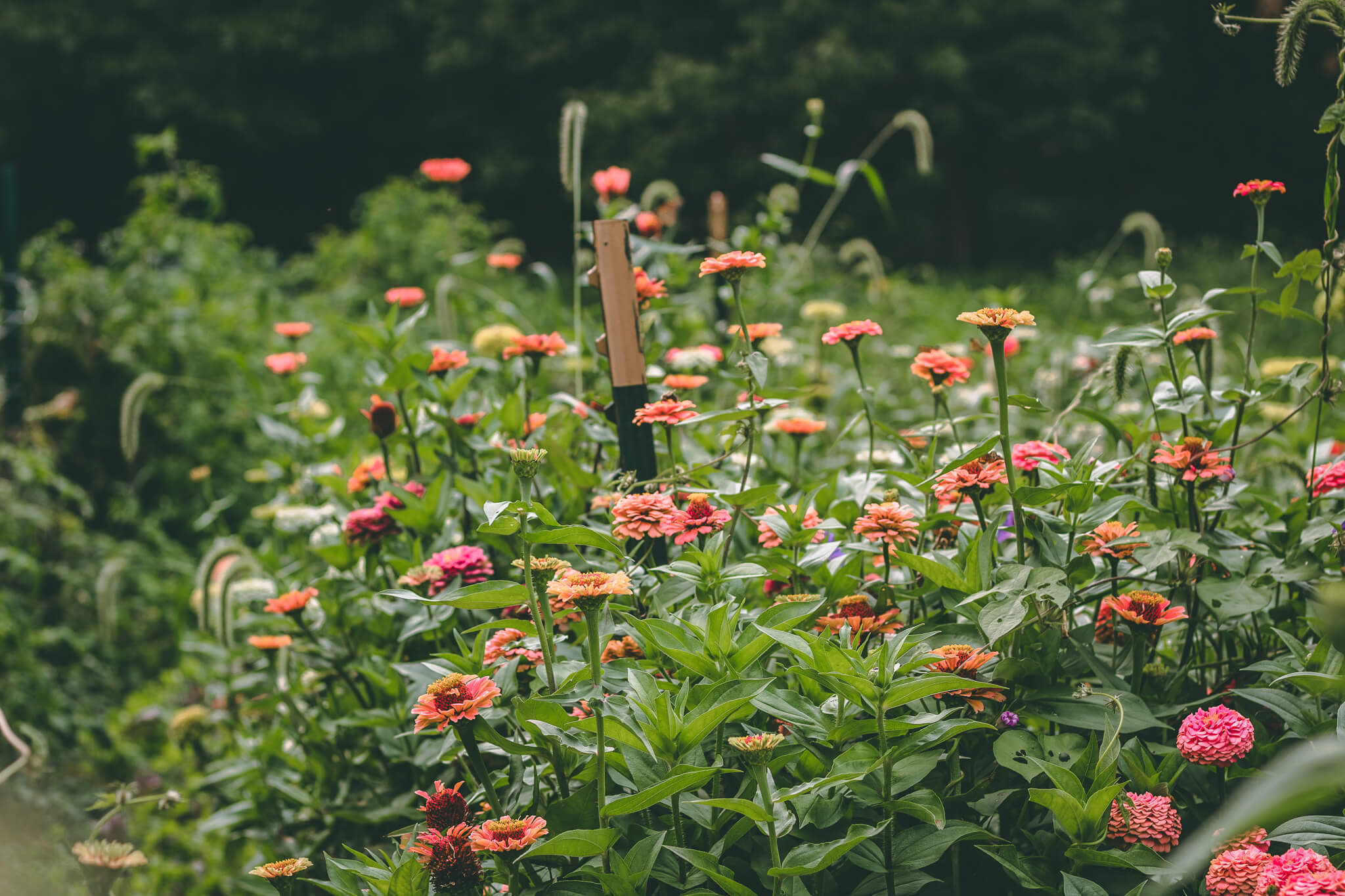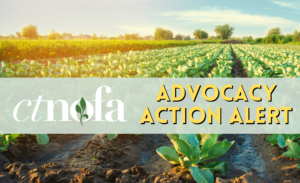Catching up with CT NOFA Journey Person, Stephanie Berluti

September 21, 2020
We recently had the opportunity to catch up with Stephanie Berluti, one of two farmers in our 2020 Journey Person program at her farm, South Haven Farm, in Orange, CT.

Stephanie officially started South Haven Farm in early 2020 where she grows crops including kale, radishes, carrots, tomatoes, collards, swiss chard, and flowers on a ½ acre of land using organic methods. She will also be starting microgreens for the fall and winter. While she is not yet USDA certified, Stephanie knows this is the direction she wants to take and is using her knowledge of organic practices from her farming experience while she begins the process of organic certification.
Stephanie spent the last 6 years traveling around the country and learning to grow in different climates and soil types culminating with the CT NOFA Journey Person program and the beginning of South Haven Farm.
“Having the opportunity to be a part of CT NOFA’s journeyperson program has given me a leg up in my first year of running my own operation, both financially and mentally. I was able to use my stipend to expand my cultivation tool kit by purchasing a garden tiller and a high-quality wheel hoe. The stipend allowed me to higher quality tools at a greater cost that will last ions longer than the cheaper version that I would probably hate and replace within my first few years”.

She began her farming career as an apprentice at Serenbe Farms outside of Atlanta, GA, then spent a season farming by the beach on Martha’s Vineyard at North Tabor Farm. Stephanie then honed her market garden farming skills at Steadfast Farm in Phoenix, AZ as their assistant farm manager. Finally, in 2018, Stephanie returned to Connecticut where she is currently the NY/CT gardener for Green City Growers (based in Boston) where she manages the 30 Rock Chef’s Garden for the Rainbow Room in NYC. However, due to COVID all of those sites were placed on hold this year.
These diverse farming experiences were invaluable in starting her own farm operation. “I don’t know if I would have had the confidence to begin a project like this without the knowledge I gained from those farms”. It wasn’t only knowledge of growing practices that were valuable for Stephanie, but also business practices and consumer engagement. “I learned a lot from the different ways these farms marketed and sold their products. In Atlanta, since I worked on a farm located in an Agri-hood (planned community based around a farm) we focused more on direct to consumer sales and building personal relationships with families in the community through educational programs and events. At Steadfast Farm in Arizona, I was able to engage more with the local culinary scene around the Phoenix Valley and learn how to balance the needs of each sales sector. Learning how different farms around the country sold and marketed their products has been really helpful with my own business plan here in Connecticut”.

In her first year of operation, Stephanie is using this time to learn and experiment. “One of the biggest challenges for me this year was self-management. Being a one-woman operation with other professional commitments outside of the farm was definitely a learning curve. Prioritizing administrative tasks vs boots-on-the-ground farm work can be pretty difficult. I still have a way to go in learning how to balance the fieldwork with the office work, forcing myself to catch up on necessary paperwork even though there are beds that need to be weeded. ”
One element that proved to be particularly challenging this year was the weather. As the climate continues to change and become more and more unpredictable, farmers find themselves having to adapt to more severe weather events. “For me, this was a huge wake-up call in how I have to adapt my growing practices. During the storm a few weeks ago, I lost what was the beginning of my greenhouse and the ongoing drought has really forced me to think about my water use and how I am going to irrigate my crops for the future. I am already thinking about ways I can be more resilient on my farm in the face of climate change. I don’t think there is a single farmer that is unaffected by this issue and, as a community, we really need to come up with aggressive adaptation strategies”.

While learning what works and doesn’t’ work on her farm, Stephanie also had to balance the challenges of starting a new farm during the backdrop of a global pandemic. “Trying to start a farm during the COVID-19 pandemic has presented its own set of unique challenges to what I knew was already going to be a difficult endeavor, mainly having to reset my entire business plan to account for the disappearance of my potential wholesale customers and shift to direct to consumer sales. I wasn’t planning on opening an onsite store until year 2 as my original focus was on wholesale. I was lucky to have had some director to consumer sales to build off of”.
As farmers know all too well during these times – balancing the demand for fresh, local produce, and the importance of keeping your farm safe and healthy is no easy task and has given this industry a lot of uncertainty. Farmer-to-farmer mentorship is a central part of the Journey Person program model. Stephanie has been working with her mentor Yoko Takemura at Assawaga Farm throughout the growing season. Especially this year, when the pandemic limited face-to-face interactions, having a friend on the phone who has a similar scale and scope of farming operation can be invaluable.

Yoko Takemura of Assawaga Farm
“Speaking with my mentor, Yoko of Assawaga Farm, and discussing how they were changing up their marketing techniques in response to COVID gave me the confidence to step out of my comfort zone and approach new venues for sales. Knowing that I could text/call my mentor with questions added a nice sense of security and comfort during such an uncertain time”.

Despite these challenges during the first year of operation, Stephanie has enjoyed the process and is looking forward to the opportunities in the coming years. She has recently built a barn where she plans on hosting small to mid-sized events once it is safe to do so. “I think it is important to have other areas of cash flow on the farm when this pandemic is over. I’m very lucky to have the resources and support to put up this structure that can be used for not only cold storage for my crops but also to host events. I want this farm to serve my community with both nutritious foods and as a gathering place”.

Follow Stephanie and South Haven Farm on Instagram, Facebook, and on her website
Recent Posts
Support the CT Environmental Rights Amendment Public Hearing
This is the time to make your voice heard at the CT General Assembly in support of the CT Environmental Rights Amendment! The public hearing is when the legislators are most likely to be listening to and reading what you have to say, and then what you say goes into the public record!
Read MoreBulk Order NOFA Membership Discounts
The Bulk Order, in its previous format, is no longer taking place. The legacy of the Bulk Order continues – not as a one-time order event, but as an ongoing member benefit that supports growers, and grows over time as we add more vendors and wholesale-level access.
For 2026, we are connecting members to quality organic growing supplies with a direct-to-consumer purchasing option through our program partners: Progressive Grower and Fedco Seeds.
Read More

